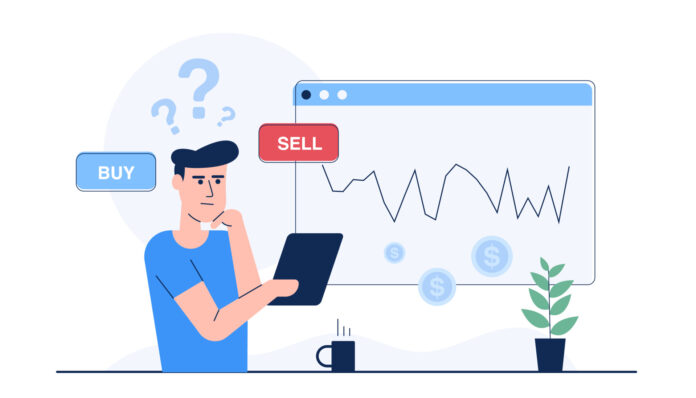To become a successful long-term investor, it’s essential to understand how the stock market works.
Here we take a look at the very basics of how different stock exchanges operate, what are stock market cycles, and what makes the stocks go up and down.
I guarantee that once you internalize everything I’ve written in this post, it’ll have a tremendous positive impact on your investing!
What Is a Stock
Let’s get the very basics out of the way first. A stock (or a share, or equity) is a share that represents an ownership of a company.
When you buy a stock, you buy a piece of the company that has issued said stock.
For example, if a company has issued 1,000 stocks and you’d buy 100 of them, you’d own 10% of that company.
As a stock owner, you’re entitled to the company’s earnings and assets. So, if the company makes a profit and pays a dividend to its owners, you’re entitled to receive that dividend.
So, in a way, the company you own, and all its employees basically work for your benefit, while all you have to do is own the stocks.
It’s capitalism at its finest, is it not?
What Is the Stock Market & Other Stock Market Basics
Okay, so you’ve decided you want to become an investor and it’s time to buy stocks.
But how can you get your hands on these magnificent beasts?
Surely, it wouldn’t be efficient to go from door to door asking people whether they own stocks and might be willing to sell some of them.
Luckily, there are places called stock markets (or stock exchanges).
Simply put, a stock market is the place where buyers and sellers meet to exchange their stocks. There are over 80 different stock exchanges around the world, but when people talk about how the stock market is doing, they generally refer to The New York Stock Exchange. Its performance is measured by stock indices such as the S&P 500 and the Dow Jones Industrial Average.
But how does the stock market work?
In the stock market, stocks are traded between buyers and sellers at a price they see fit. This brings us to an important conclusion:
Whenever you buy a stock, someone else is willing to sell it.
Therefore, in the case of individual stocks, you have the opposite view about the future of that stock. It’s worth remembering that whenever you make a trade.
When you think about it, the stock market is a pretty amazing place. Imagine a place where millions and millions of investors gather to collectively decide how much they’re willing to pay for certain stocks and form a price for all publicly traded companies.
What’s even more amazing is that most of the time, they collectively decide to either pay too much or too little for stocks.
What Makes the Stock Market Go Up and Down
As you can see when you look at different stock index graphs, the stock market doesn’t evolve linearly. Far from it. The market is filled with rapid upswings and massive downswings.
And what’s the reason? People.
The stock market is all about supply and demand. When there are more people buying than selling stocks, the buyers are willing to pay more for their stocks and the prices go up, and vice versa.
As long as there are people involved with the stock market, it’s prone to swing between strong bull markets and terrifying bear markets.
I’d like to think that if the stock market were controlled completely by artificial intelligence, it would rise linearly without bubbles and crashes.
But, as it is, it’s people who make the market unpredictable and prone to extremes.
Investors’ willingness to buy and sell stocks is, in my opinion, dictated by fear and greed. Investors get greedy during good times and fearful during bad.
When investors are greedy, stock prices go through the roof, and expected returns diminish. When fear controls the market, stock prices fall and expected returns start to rise.
The Stock Market as a Pendulum
I think one of the best ways to think about the stock market comes from Howard Marks, who introduced the idea of the stock market pendulum in his book The Most Important Thing.
The idea is to think about the stock market as a pendulum, where the pendulum merely passes the middle while swinging between market extremes.
Of course, the pendulum can’t go on to extremes forever, which means that it will eventually pass the middle again while it travels to the opposite extreme. The main lesson is that neither good nor bad times last forever.
The middle part is the “neutral zone” or the place where stocks are correctly priced.
It’s actually quite an ingenious way to think about the stock market and has definitely helped me to make sense of the stock market.
Stock Market Cycles
“Understanding cycles and having the emotional and financial wherewithal needed to live through them are essential ingredients in investment success.” -Howard Marks
Every investor who’s been around for more than a decade is familiar with stock market cycles. A cycle is a term that describes how the stock market moves from high to low, and back high again.
Ideally, an investor should be aggressive at the bottom of the stock market cycle, and defensive at the peak.
Most investors grasp the concept of market cycles, but they also make the mistake of trying to predict the market cycle.
Predicting anything, especially the future, is extremely difficult. Therefore, one shouldn’t base investment decisions wholly on predictions.
Rather than trying to predict where the stock market is going, it’s more important to get a grasp on where it is at the moment.
Why You Need to Understand Stock Market Cycles
But why exactly is it so important to know where we are in the stock market cycle?
Well, that’s because I believe it determines your expected returns in the future. Also, for active investors, it can determine whether you take an aggressive or defensive approach to your investments.
The higher the stock prices get, the less returns there are to be expected in the near future. In these situations, a defensive approach is Conversely, the cheaper the stocks are, the more potential there is for high returns.
In other words, a smart investor can use the stock market cycle to his benefit by buying stocks when they’re cheap and refrain from buying when stocks are overpriced. The difficult part is, of course, knowing which phase we are in the cycle.
For passive index fund or ETF investors who invest regularly, it doesn’t really matter where we are, since their investment strategy is based on dollar-cost-averaging.
Why Stock Market Bubbles and Crashes Happen
The history of the world is filled with different stock market bubbles. In hindsight, things like getting way too excited about tulip bulbs may seem insane, and that’s exactly what they are.
When investors get overly excited about the stock market, they bid up the prices until all reason has left their collective minds.
Unfortunately, what goes up, must eventually come down. At some point, there are no more buyers left, and investors begin to sell. Because there are no buyers around, prices drop rapidly, and a stock market crash happens.
While there are numerous things that can cause stock market bubbles and crashes, the bottom reason is always greed and fear.
When a stock market bubble forms, investors are fearful of missing out on returns and become greedy. When the market eventually goes down, they’re afraid to lose all their money and resort to panic selling at a loss.
If there’s one thing people don’t handle well, it’s maintaining their own rationality when everyone around them is acting irrationally.
Do You Lose All Your Money If the Stock Market Crashes
One of the most common (and expensive) misconceptions about the stock market is the idea that whenever a stock market crash occurs, you somehow lose all your investments.
Fortunately, this is usually not the case for most investors.
If you have a sufficiently diversified portfolio of fundamentally sound stocks, you’ll most likely do just fine in the long term. When a stock market crash hits the market, all stocks tend to go down.
No matter their quality. Once the panic is over and recovery begins, the stock market will recover and reach new highs. Historically speaking, it always has.
Then again, if you’ve bought highly speculative assets with high leverage, you might be forced to sell your holdings at a loss due to margin calls, and truly end up losing your money.
Therefore, it’s best to avoid overly risky investment strategies. The idea of long-term investing is to invest, not to gamble or speculate.
For passive index investors who invest in widely diversified, major stock market indexes like the S&P 500, there’s literally nothing to worry about. Moreover, stock crashes have historically been great chances to buy more stocks at cheaper prices.
Overall, I think it’s worth pointing out that until you sell your holdings, you haven’t lost anything. Only when you sell the investments that have negative returns, do you lock in your losses.
What If No One Buys Your Stocks
Sometimes it’s perfectly reasonable to sell a stock. I won’t go into specifics here, but you can read more about it in my post about when to sell a stock.
But what if no one wants to buy your stocks, are you doomed to hold your stocks from here to eternity?
I can say with some certainty that for most investors, this will never be the case. When you own stocks at a publicly traded company in a major stock exchange, there will always be buyers.
On the off chance that you own some over-the-counter stocks that aren’t traded in a public stock market, it might be that there really isn’t anyone willing to buy your stocks.
A common misconception is that in this case, your broker would buy your stocks, but that’s not how it works. Your broker only arranges transactions between buyers and sellers. Therefore, a broker is not compelled in any way to buy your stocks from you.
In any case, if there are no buyers around, you would simply be forced to hold them until a buyer emerges.
Again, this is practically impossible if you own publicly traded companies, so don’t lose your sleep over it!
How Does the Stock Market Make You Money
Generally, the profits come in the form of value appreciation (stock price increases) and dividends. In other words, you make money when the stocks you own go up in price, or when the companies pay you dividends.
Of course, the mere value appreciation doesn’t magically bring money into your pocket. You also need to sell your stocks at a profit. The difficult part for a long-term investor is to know when to sell, if ever.
Dividends, on the other hand, are something you have no control over as a stock picker. The company decides how much they will pay dividends, and that’s that.
It’s worth mentioning that a lot of companies also buy back their own stocks and cancel them, which reduces share capital and increases the stock prices for remaining shareholders.
If a stock is undervalued in the market, stock buybacks can be a powerful way to create value for stock owners in the long term.
Fund investors can generally choose whether they want dividends or not. Growth funds automatically reinvest the dividends without paying them out. This creates a significant tax benefit in the long term. Income funds, on the other hand, pay out dividends.




